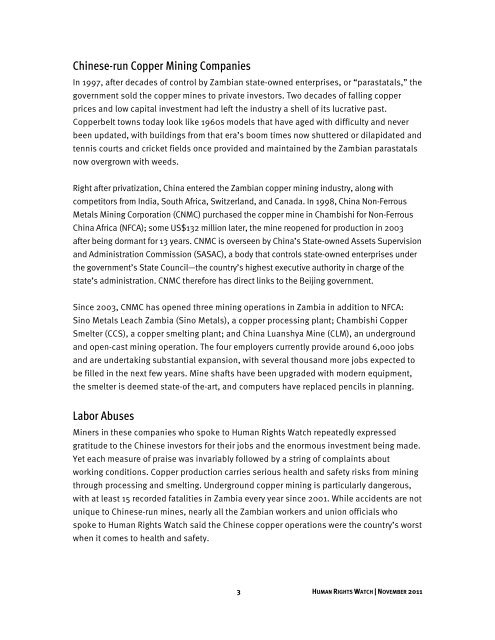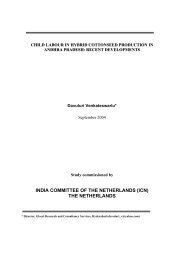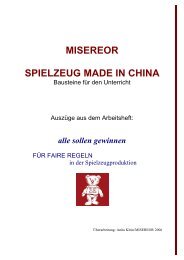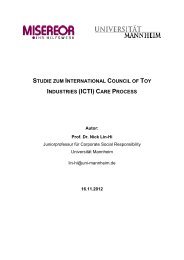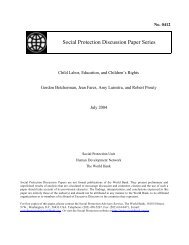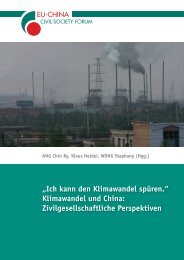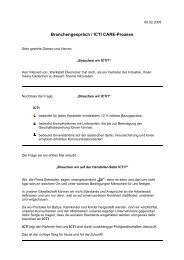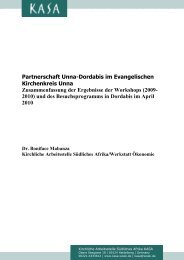“You'll Be Fired if You Refuse†- Human Rights Watch
“You'll Be Fired if You Refuse†- Human Rights Watch
“You'll Be Fired if You Refuse†- Human Rights Watch
Create successful ePaper yourself
Turn your PDF publications into a flip-book with our unique Google optimized e-Paper software.
Chinese-run Copper Mining Companies<br />
In 1997, after decades of control by Zambian state-owned enterprises, or “parastatals,” the<br />
government sold the copper mines to private investors. Two decades of falling copper<br />
prices and low capital investment had left the industry a shell of its lucrative past.<br />
Copperbelt towns today look like 1960s models that have aged with d<strong>if</strong>ficulty and never<br />
been updated, with buildings from that era’s boom times now shuttered or dilapidated and<br />
tennis courts and cricket fields once provided and maintained by the Zambian parastatals<br />
now overgrown with weeds.<br />
Right after privatization, China entered the Zambian copper mining industry, along with<br />
competitors from India, South Africa, Switzerland, and Canada. In 1998, China Non-Ferrous<br />
Metals Mining Corporation (CNMC) purchased the copper mine in Chambishi for Non-Ferrous<br />
China Africa (NFCA); some US$132 million later, the mine reopened for production in 2003<br />
after being dormant for 13 years. CNMC is overseen by China’s State-owned Assets Supervision<br />
and Administration Commission (SASAC), a body that controls state-owned enterprises under<br />
the government’s State Council—the country’s highest executive authority in charge of the<br />
state’s administration. CNMC therefore has direct links to the <strong>Be</strong>ijing government.<br />
Since 2003, CNMC has opened three mining operations in Zambia in addition to NFCA:<br />
Sino Metals Leach Zambia (Sino Metals), a copper processing plant; Chambishi Copper<br />
Smelter (CCS), a copper smelting plant; and China Luanshya Mine (CLM), an underground<br />
and open-cast mining operation. The four employers currently provide around 6,000 jobs<br />
and are undertaking substantial expansion, with several thousand more jobs expected to<br />
be filled in the next few years. Mine shafts have been upgraded with modern equipment,<br />
the smelter is deemed state-of the-art, and computers have replaced pencils in planning.<br />
Labor Abuses<br />
Miners in these companies who spoke to <strong>Human</strong> <strong>Rights</strong> <strong>Watch</strong> repeatedly expressed<br />
gratitude to the Chinese investors for their jobs and the enormous investment being made.<br />
Yet each measure of praise was invariably followed by a string of complaints about<br />
working conditions. Copper production carries serious health and safety risks from mining<br />
through processing and smelting. Underground copper mining is particularly dangerous,<br />
with at least 15 recorded fatalities in Zambia every year since 2001. While accidents are not<br />
unique to Chinese-run mines, nearly all the Zambian workers and union officials who<br />
spoke to <strong>Human</strong> <strong>Rights</strong> <strong>Watch</strong> said the Chinese copper operations were the country’s worst<br />
when it comes to health and safety.<br />
3 HUMAN RIGHTS WATCH | NOVEMBER 2011


